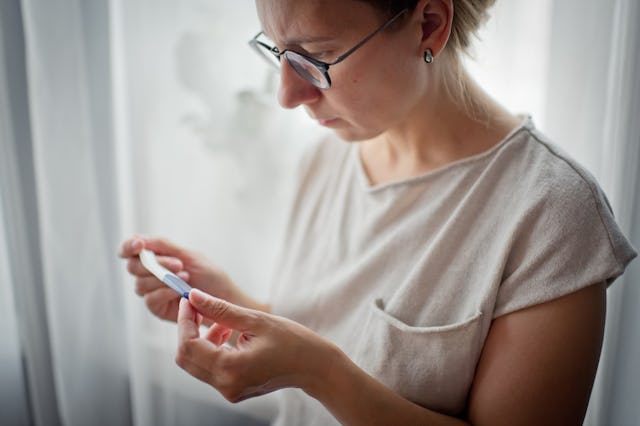Need-To-Know Info: Can You Get Pregnant During Perimenopause?
Don’t toss out the contraceptives just yet.

While the idea of entering perimenopause can feel daunting, there are a few potential silver linings for many period-havers. I mean, it's a precursor to not having your period every month. Just think of the money you'll save each year not buying pads or tampons or replenishing your period panty supply! And, if you've reached the point where you are no longer expanding your family, you're probably pretty pumped about skipping the occasional pregnancy scare since you can't get pregnant in perimenopause, right? ... ... Right?
Wrong! While it's true that you can no longer get pregnant once you've fully entered menopause (and had as much confirmed by your doctor), it is still possible during perimenopause. You do, after all, still ovulate during perimenopause. So, while the chance of pregnancy is smaller, it still exists — meaning if you don't think your patience or body can handle the stress of another pregnancy, you should still be using contraceptives when you have sex.
However, if you're in perimenopause and are want to get pregnant in the future, you probably consider this hopeful news. But getting pregnant may not be as simple as tossing the condoms in the trash or getting off of birth control.
Here's what doctors have to say on the subject of perimenopause and pregnancy.
First, what is perimenopause?
Many of us have been taught to lump everything that happens during perimenopause and menopause into one big, awful basket, but they are two distinct phases.
Perimenopause literally translates to "around menopause." It (and its symptoms) can last from a few months to years, typically beginning in the mid-40s.
Menopause is marked by having gone 12 months without a period. That means that if you've gone 11 months with no period and then suddenly start spotting... you're probably still in perimenopause.
However, early menopause also exists, so if you're dealing with perimenopausal symptoms like irregular periods, hot flashes, bloating, sleep disturbances, or mood swings, you should see your doctor to discuss the possibility and any potential underlying causes.
If your period is irregular during perimenopause, can you still get pregnant?
"Absolutely!" says Dr. Felice Gersh, M.D. OB-GYN and founder/director of the Integrative Medical Group of Irvine, in Irvine, CA. "Although fertility is significantly lower than it was in previous years, such lowered fertility is definitely not synonymous with sterility. In fact, pregnancy occurring during the perimenopausal period is more likely to be with twins. This happens as the pituitary hormones that stimulate ovulation are often released at supremely high levels."
How is that possible? If you're still having periods, you're still ovulating. If you're still ovulating, there's still a chance you'll get pregnant.
"Most [people] continue to have ovulatory menstrual cycles, at least sporadically," says Gersh. "These ovulatory cycles may be irregular and unpredictable, and the quality of the eggs ovulating is often poor and not compatible with fertility. [People] in perimenopause still have a supply of eggs, but such eggs are typically of a poor quality, and ovulation can be quite infrequent and unpredictable."
How can you tell if you're pregnant during perimenopause?
Now that your body is going through some big changes that feel completely unfamiliar and unpredictable, knowing when you're pregnant may seem like something that requires additional steps. But Gersh says not much actually changes in that regard.
"No difference occurs when a pregnancy occurs, whether during the perimenopause or earlier," says Gersh. "If the menstrual period is late, a pregnancy test is indicated, assuming any sexual activity occurred. This is indicated even if the periods have been irregular. Additionally, the usual pregnancy symptoms can occur, such as breast tenderness, nausea and vomiting, and fatigue. These symptoms would also warrant getting a pregnancy test. Abnormal symptoms, such as spotting or irregular bleeding or pelvic pain, are also symptoms that indicate that a pregnancy test is indicated."
In other words, if you're in perimenopause, have been having sex, and have any pregnancy-like symptoms, take a test — even if that pesky perimenopause hallmark of irregular periods keeps you guessing about your cycle and when you're ovulating.
How will pregnancy be different during perimenopause?
Anyone who has had a baby in their 20s and, again, in their late 30s can tell you exactly how different pregnancy is as you age. It's just the same when you're pregnant during perimenopause in that the risks are inherently higher.
"Older [mothers] have a higher risk for developing pregnancy complications, such as miscarriage, hypertension, gestational diabetes, preterm labor, placental abruptions, larger and smaller birth weights, and pre-eclampsia," explains Gersh.
Gersh explains that irregular periods in perimenopausal people often lead to uncertain dates, meaning you may need an ultrasound to help with dating your conception. And that won't be the only additional testing you'll likely require. "Chromosomal abnormalities are more common, and prenatal testing is indicated," Gersh says.
Still, she points out that the main thing to keep in mind about perimenopause and pregnancy is that you're more prone to having twins and pregnancy complications. "Their dates are often uncertain, and they are more prone to having cesarean sections. They need more intensive following and fetal and maternal monitoring," Gersh reiterates. "Nevertheless, with proper prenatal care, the majority will have excellent outcomes for mom and baby!"
Don't want a baby? Continue to use protection and speak with your OB-GYN about the birth control most appropriate for use during perimenopause.